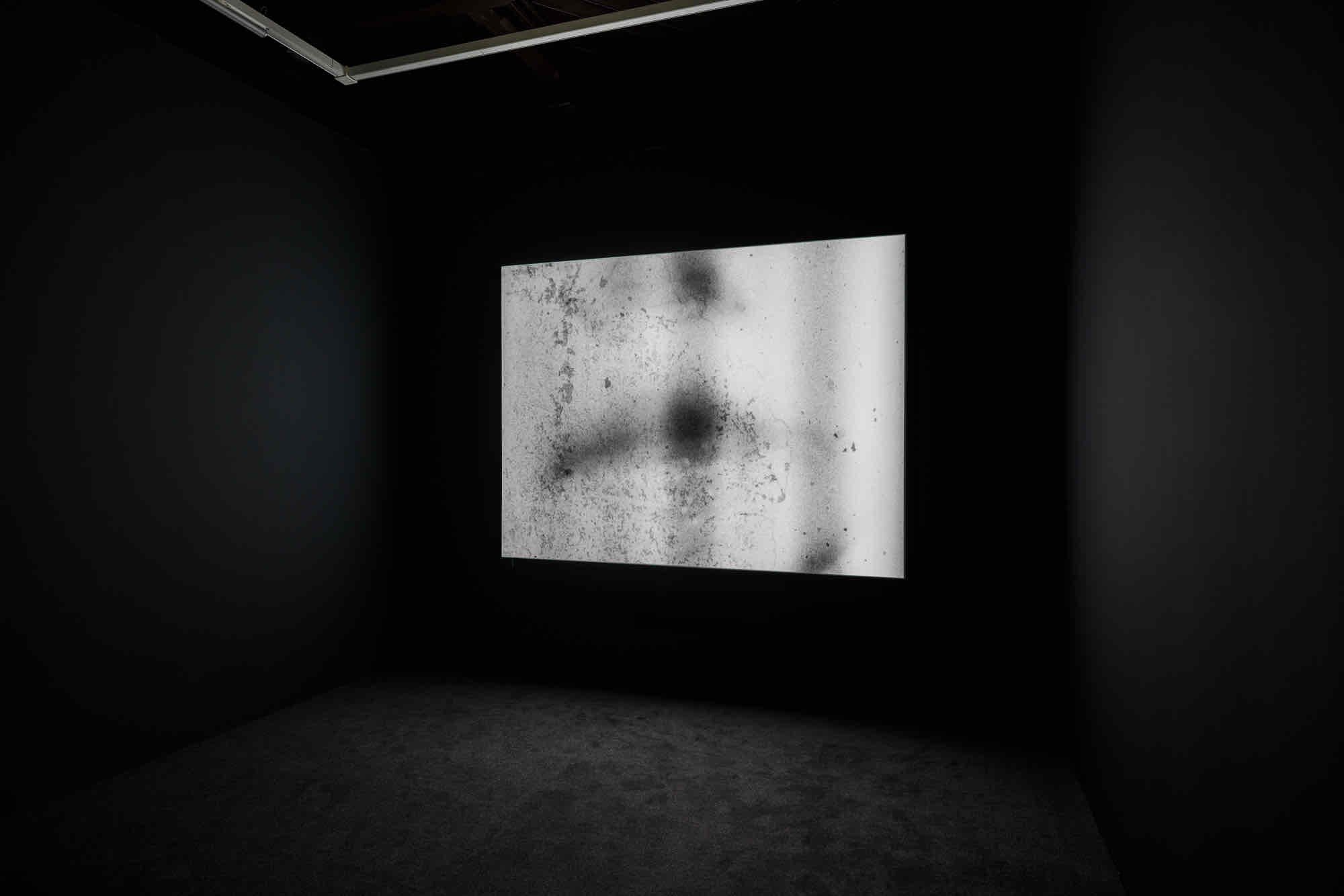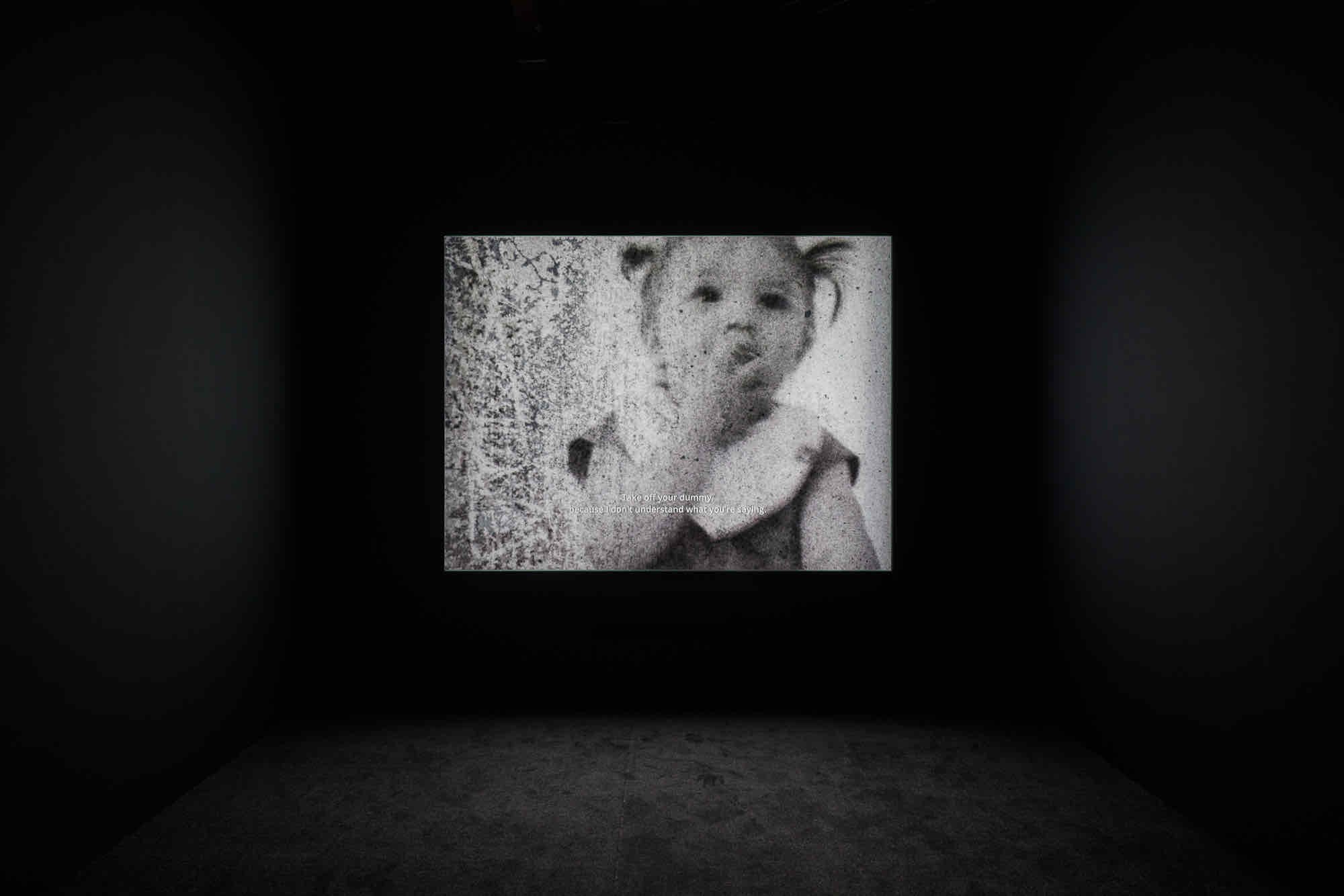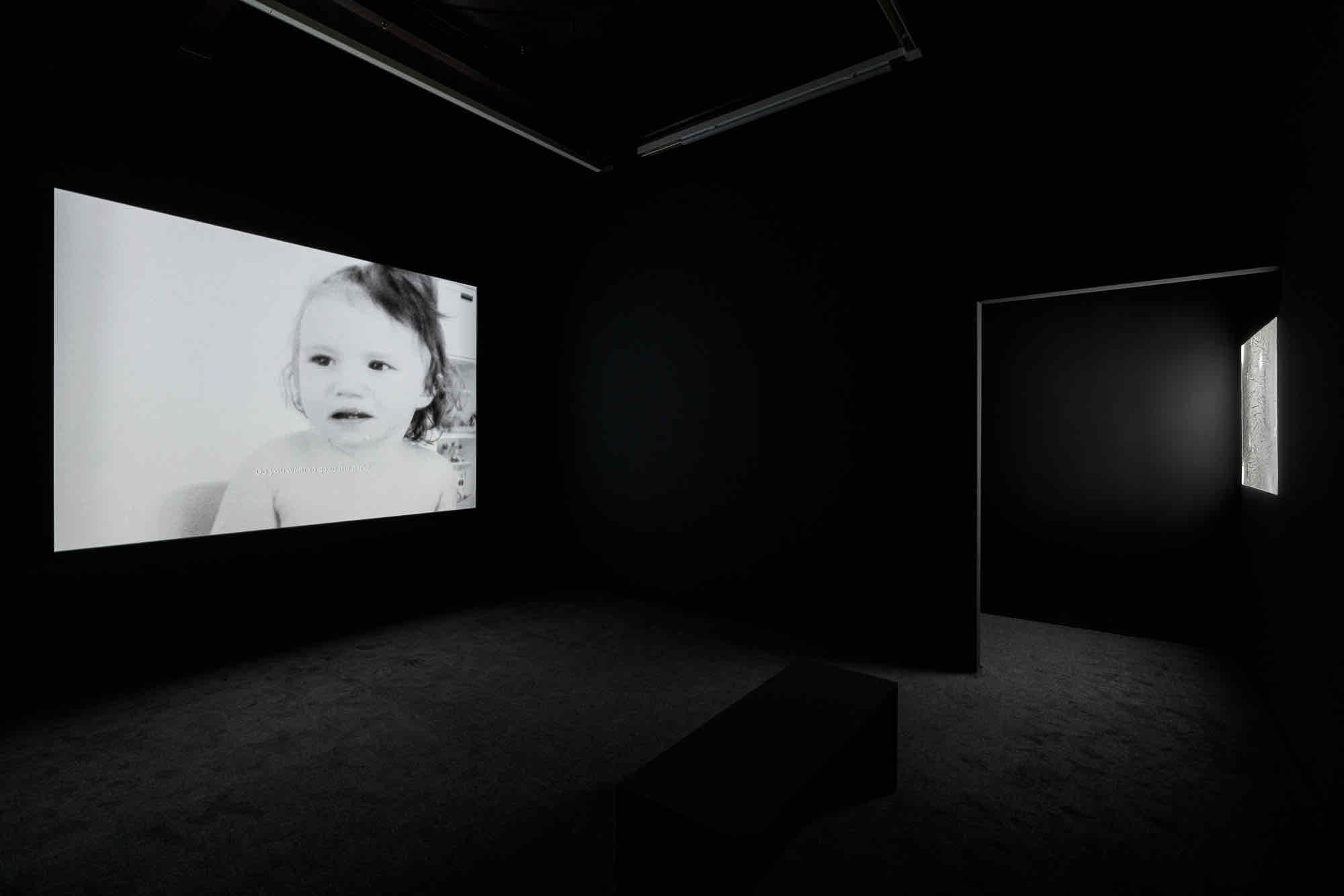Luz Olivares Capelle
Fluid Imprint
14 Dec 2024 - 16 Feb 2025

Exhibition view ‘Luz Olivares Capelle. Fluid Imprint,’ Salzburger Kunstverein 2024, photo: kunst-dokumentation

Exhibition view ‘Luz Olivares Capelle. Fluid Imprint,’ Salzburger Kunstverein 2024, photo: kunst-dokumentation

Exhibition view ‘Luz Olivares Capelle. Fluid Imprint,’ Salzburger Kunstverein 2024, photo: kunst-dokumentation
Fluid Imprint: On the Crystallization of Language in Luz Olivares Capelle‘s 3-channel film and sound installation los que vuelan (those, who fly)
Soon after the birth of her daughter Sol Ricarda, Luz Olivares Capelle started to video document the speech formation of her child, embodying an attempt to find consistency between the materiality of the analog film medium itself and the initially nebulous and amorphous words of her daughter, which crystalize into what we perceive as language and narrative over time.
In los que vuelan (those, who fly) (2024) we experience human language in its most primal forms—through cries, whispers, and the chaotic babble of words that come out of the mouth of Sol. These words are juxtaposed with the physicality of the chemical aberrations that unfold on the film stripe, which leads me to questions: how these two processes might be compared? What is that space before language in which the child lives? And what it means to inhabit the roles of the mother and the artist at the same time?
Starting with the latter and perhaps most challenging of the above: the inhabiting the roles of both mother and an artist simultaneously, as Luz Olivares Capelle does, involves a complex interplay between personal and the public. Los que vuelan exposes a symptomatic blind spot of the capitalist art sphere: being the mother-artist requires care labor; it involves a unique vulnerability, as the intimate bond with the child becomes the subject of artistic exploration, open to public interpretation and critique. Los que vuelan creates a space for the mothered and the mothering self to emerge. It might be the space of the most complex and deep hospitality, the host being the mother and the guest being the child, and their mutual transformation, as both subjects crystalize as new individuals.
In his work on child’s early development, the psychoanalyst D.W. Winnicott conceived the maternal face to be the precursor of all mirrors that reflects the baby's internal states and gives them the feeling of existing. I see Winnicott’s idea at play in los que vuelan. The space before language that Sol (the child) and Luz (the mother) inhabit can be described as pre-linguistic, where communication is based not on words but on sounds, as well as emotional and intuitive interactions. This critical space is yet unmediated by the structured systems of language. It's a realm where meaning is not yet fixed and where every cry, laugh, or gesture has the potential to communicate needs or feelings in a direct, albeit non-verbal, manner.
The processes of this crystallization of language in Sol Ricarda and the experimental approach to film parallel each other: both involve an evolution from an unformed, raw state to a more defined and refined identity. Just as child’s initial babble gradually coheres into discernible language, the film medium Luz works with moves from chemical imperfections and visual noise to a clearer, though still uniquely altered, image.
For los que vuelan, Luz embarked on a long-term observation spanning two and a half years, capturing nuances and developments of her child over time. This extensive footage was then meticulously compressed into less than 15 minutes during editing. Los que vuelan demands a continual negotiation of boundaries and roles, melding personal life with artistic output in a way that is both deeply personal and universally resonant.
Text: Mirela Baciak
Soon after the birth of her daughter Sol Ricarda, Luz Olivares Capelle started to video document the speech formation of her child, embodying an attempt to find consistency between the materiality of the analog film medium itself and the initially nebulous and amorphous words of her daughter, which crystalize into what we perceive as language and narrative over time.
In los que vuelan (those, who fly) (2024) we experience human language in its most primal forms—through cries, whispers, and the chaotic babble of words that come out of the mouth of Sol. These words are juxtaposed with the physicality of the chemical aberrations that unfold on the film stripe, which leads me to questions: how these two processes might be compared? What is that space before language in which the child lives? And what it means to inhabit the roles of the mother and the artist at the same time?
Starting with the latter and perhaps most challenging of the above: the inhabiting the roles of both mother and an artist simultaneously, as Luz Olivares Capelle does, involves a complex interplay between personal and the public. Los que vuelan exposes a symptomatic blind spot of the capitalist art sphere: being the mother-artist requires care labor; it involves a unique vulnerability, as the intimate bond with the child becomes the subject of artistic exploration, open to public interpretation and critique. Los que vuelan creates a space for the mothered and the mothering self to emerge. It might be the space of the most complex and deep hospitality, the host being the mother and the guest being the child, and their mutual transformation, as both subjects crystalize as new individuals.
In his work on child’s early development, the psychoanalyst D.W. Winnicott conceived the maternal face to be the precursor of all mirrors that reflects the baby's internal states and gives them the feeling of existing. I see Winnicott’s idea at play in los que vuelan. The space before language that Sol (the child) and Luz (the mother) inhabit can be described as pre-linguistic, where communication is based not on words but on sounds, as well as emotional and intuitive interactions. This critical space is yet unmediated by the structured systems of language. It's a realm where meaning is not yet fixed and where every cry, laugh, or gesture has the potential to communicate needs or feelings in a direct, albeit non-verbal, manner.
The processes of this crystallization of language in Sol Ricarda and the experimental approach to film parallel each other: both involve an evolution from an unformed, raw state to a more defined and refined identity. Just as child’s initial babble gradually coheres into discernible language, the film medium Luz works with moves from chemical imperfections and visual noise to a clearer, though still uniquely altered, image.
For los que vuelan, Luz embarked on a long-term observation spanning two and a half years, capturing nuances and developments of her child over time. This extensive footage was then meticulously compressed into less than 15 minutes during editing. Los que vuelan demands a continual negotiation of boundaries and roles, melding personal life with artistic output in a way that is both deeply personal and universally resonant.
Text: Mirela Baciak
